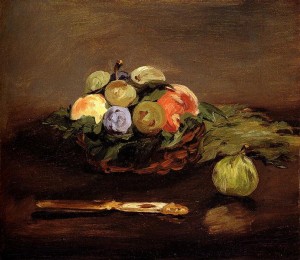Amos 8:1-12
This text is used for the Lectionary Year C on July 17, 2016.

The summer before my freshman year in college I worked at an agriculture experiment station run by the University of Tennessee. They hired me as a laborer; they had recently planted a peach orchard and needed extra hands to tend to it. I remember long hot days filled with humidity, bugs and peaches. We culled peaches often, fearing that the weight of all the fruit would harm the trees. We picked ripe peaches and sold them to the public. And we had to dispose of overripe fruit. That smell remains in my memory. Whereas our culled peaches had the subsistence of a baseball, these spoiled peaches were almost impossible to pick intact. They were soft and slimy, oozy and… you get the picture. This was summer fruit.
This week’s lectionary text concerns the fourth vision of Amos. Its central image is summer fruit. To most congregants, the phrase summer fruit may bring to mind watermelon, peaches, cantaloupe and the like. We think of picnics and refreshment, perhaps even church socials in parks. That picture could not be more antithetical to this vision. The Hebrew word for ‘summer’ in verses 1 and 2 is the exact same term used later in verse 2 by God when He replies, ‘The end…’ The vision here is not meant to conjure a cornucopia of produce. Rather, the image concerns fruit that has reached its end point—spoiled, rotten fruit.
Israel was once ripe fruit—delicious, worthy of ingestion, a fit offering. Now, she is spoiled, ruined and unacceptable to the Lord. Following this introductory image of summer fruit, the passage offers an indictment, very close to a verbatim restatement of Amos 2:6-7. The culture of Israel bends toward the acquisition of wealth by any means; it includes treating people as commodities to be bought and sold; it exhibits injustice in the market place and abject sin. Amos describes a great reversal that God will accomplish in response. This divine judgement will bring the people to a place of lament and grieving.
This imagery, associated with mourning and repentance, is likely familiar to regular congregants. However, the close of this passage in verses 11-12 offers a new and more chilling verdict. Israel will experience an absence of God’s Word. This scarcity moves beyond previous judgments of drought and famine as recorded in scripture. This dearth concerns a more fundamental, more primary necessity than food and water. The loss of God’s voice and direction will result in the people wandering aimlessly. While this may not occur as a literal journey—or it may depending on how far one views the scope of this prophecy–it denotes an extended period of Israel existing without purpose. For all the vibrant and illustrated judgments earlier in the passage, it is the removal of God’s presence from the people that I find most terrifying. This stands as a counter to the Exodus promise in Leviticus 26:12. How does a people organized and brought together by God function in the absence of that God? How would we persist without our God to communicate with and direct us?
There are several options for the preacher to bring this passage close to hearers. Our modern grocer-industrial complex has removed spoiled fruit, truly ruined produce, from our experiences. We may encounter a soft strawberry or a brown spot on an apple from time to time, but truly bad fruit never makes its way to us. However, a preacher with some forethought could allow a nice piece of fruit to spoil and present it to the congregation as an image for their consumption, perhaps even contrasting it with a piece of delectable fruit. We have a visceral reaction to spoiled food. The power of this image is in its experience, not telling or describing. Let the congregation see and consider how God describes Israel. Let the congregation reflect upon their status as fruit.
The tragedy in this image is in the wasting of the fruit. This passage stands in contrast to Matthew 7:17-20. Israel is not a bad tree bearing bad fruit. It bears good fruit. The fruit was ripe and acceptable. However, it has turned; Israel missed its timing to properly serve its Lord. Now it stinks. It has failed to fulfill its purpose and has transformed from an asset into a liability. Israel’s sinfulness has made it a something to be avoided. God will dine on other fruit. God, having once chosen Israel, now chooses something besides Israel.
There is an opportunity here to emphasize the gravity of our sin and disobedience. Our worship of God consists of more than ritual; it encompasses our personal lives, professional lives and every relationship. Failing to live in complete obedience to God results in our spoilage. How do our choices ruin us for God’s use? How does our sinfulness drive God away? How do we respond to God’s silence?
This passage lacks any semblance of hope. It does not offer a final word of redemption or of God’s return to the Israelites. The fruit is not restored. However, there is a parallel between the judgment of Amos 8:9 and Matthew’s account of Christ’s crucifixion in 27:45. We have in Christ Jesus God’s constant and full Word to us. We may also say that Jesus is God’s final Word. Perhaps the Word made flesh offers us constant hope and the promise of redemption for our sinful, spoiled lives.
 James H. Coston
James H. Coston
Senior Pastor
Calvary Baptist Church, Waco, Texas
james_coston@baylor.edu
Tags: spoiled fruit, eschaton
